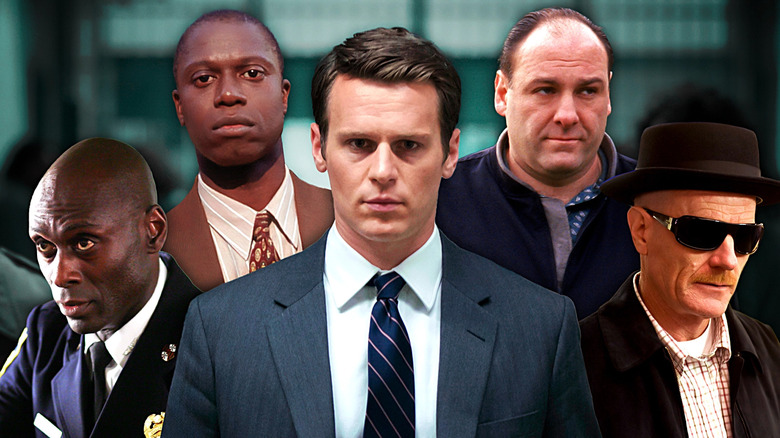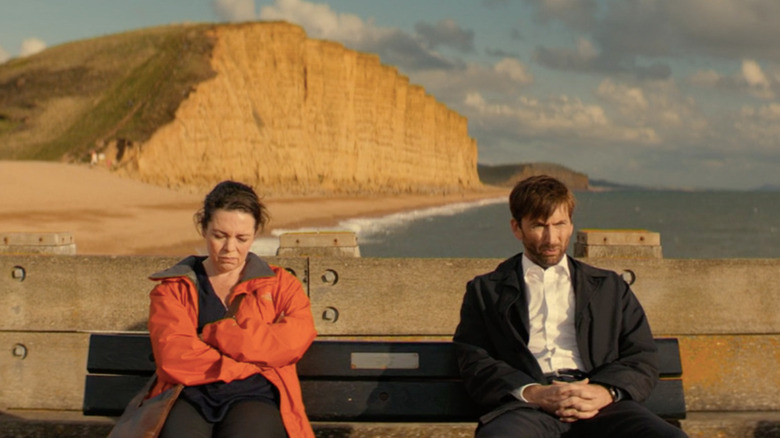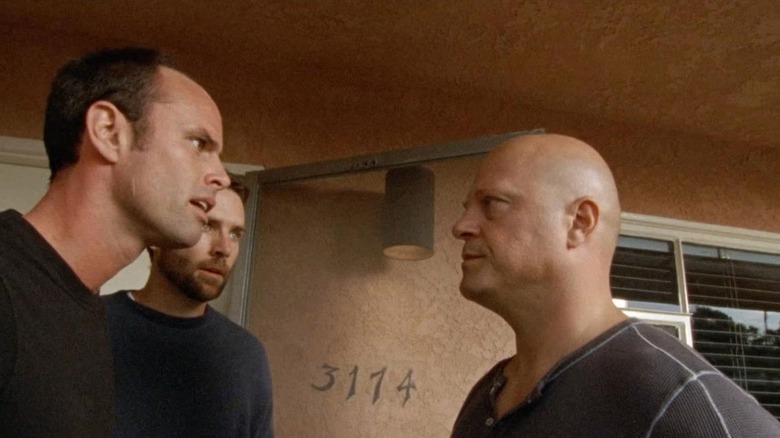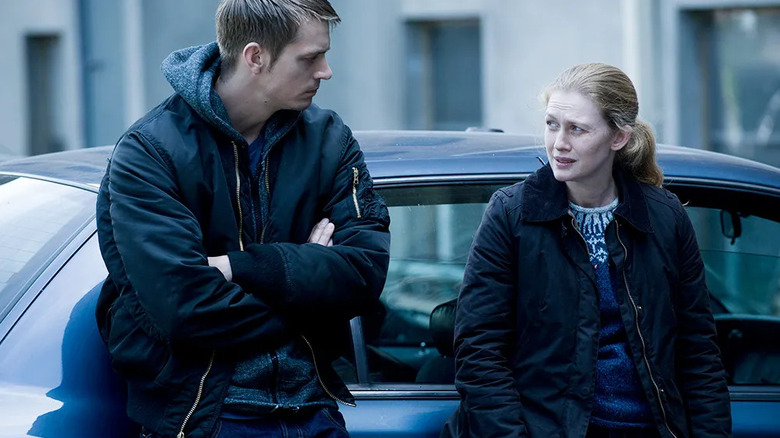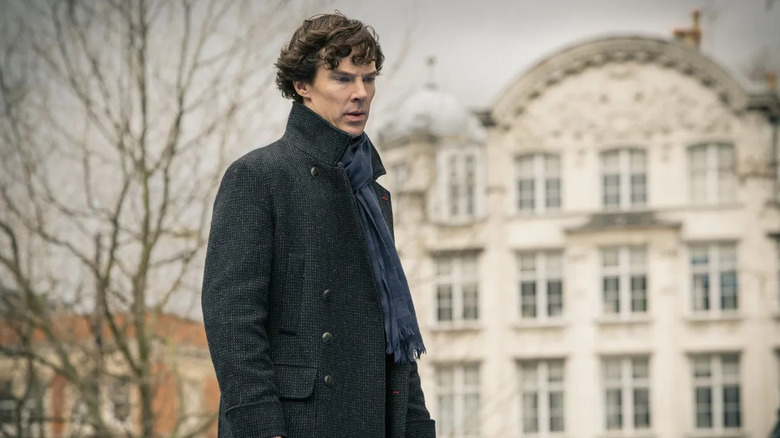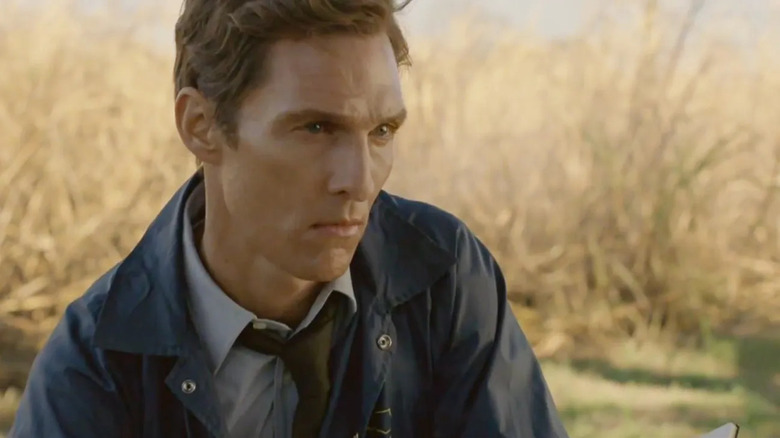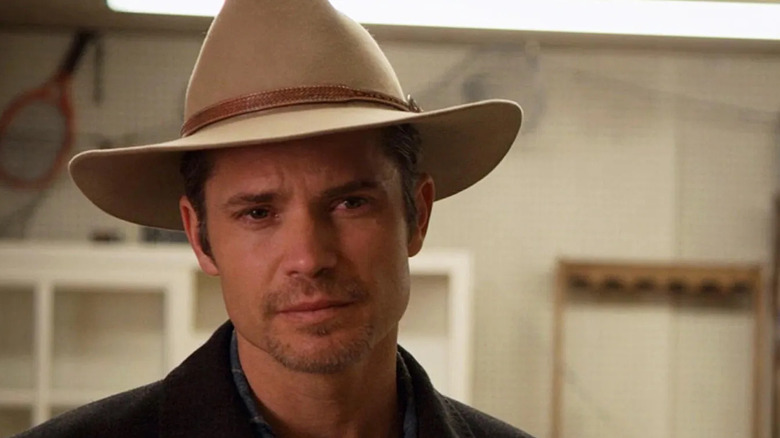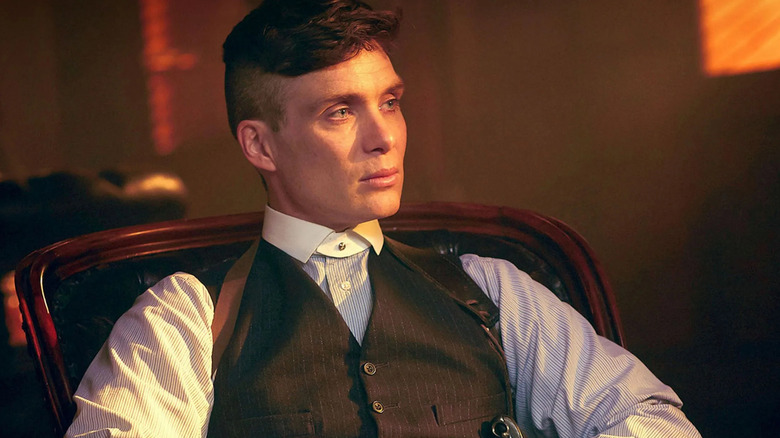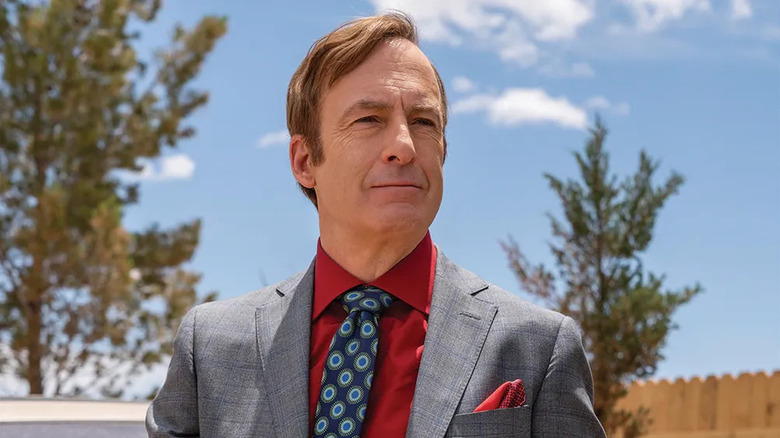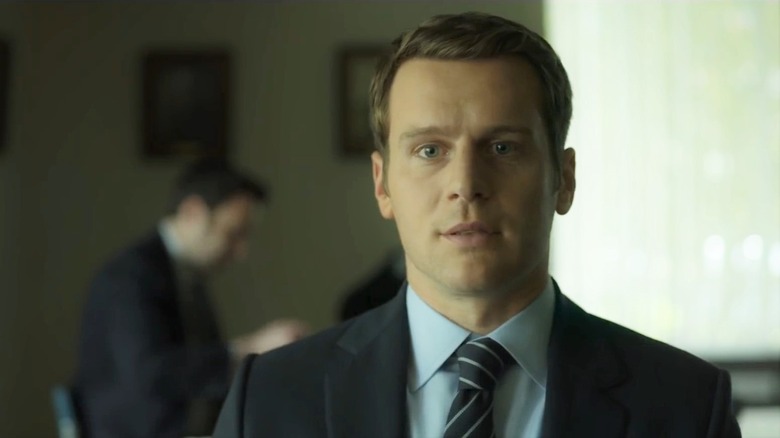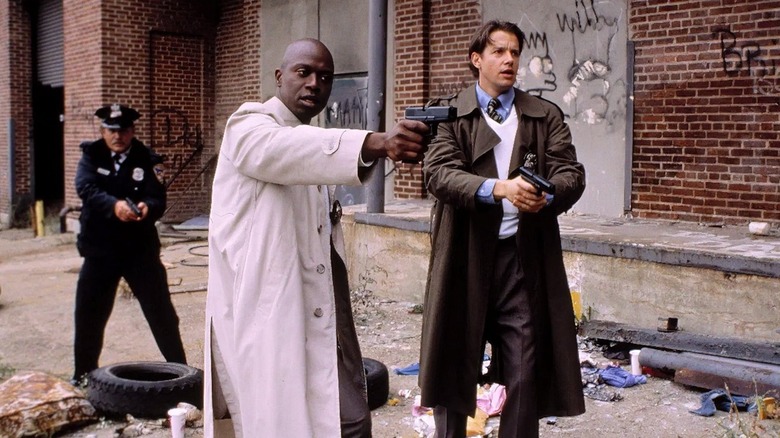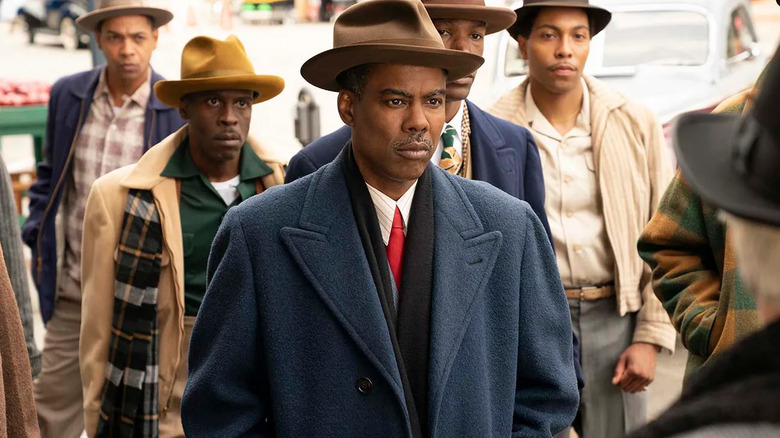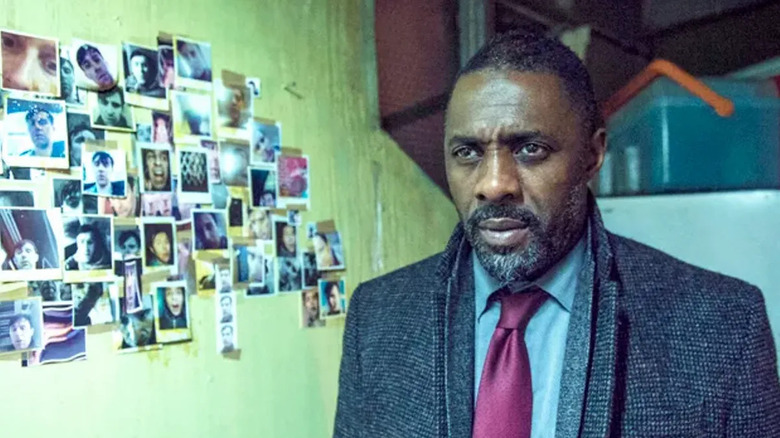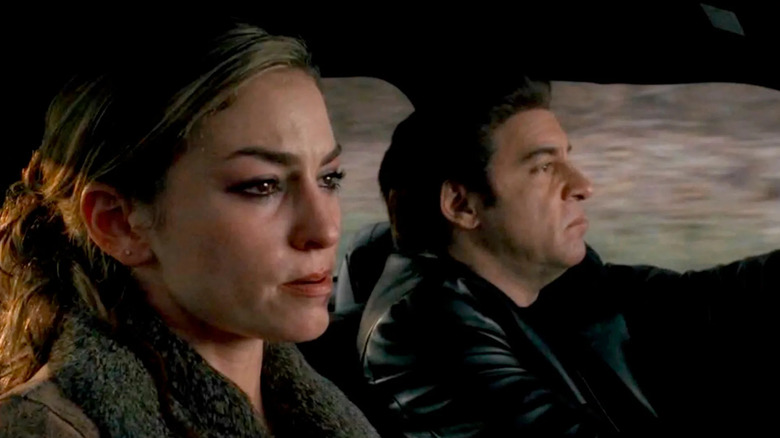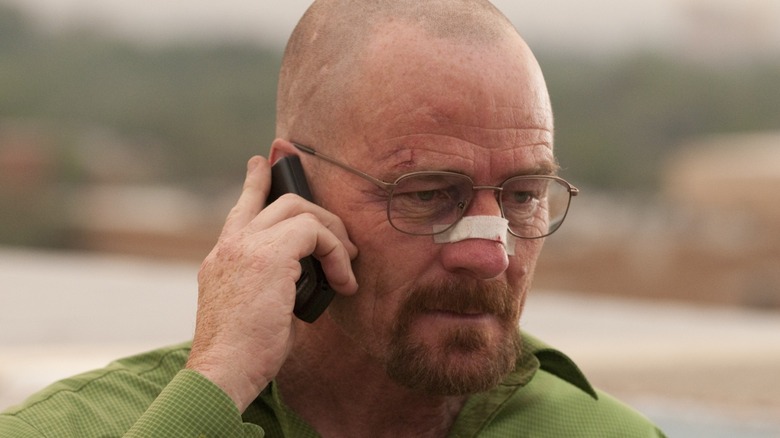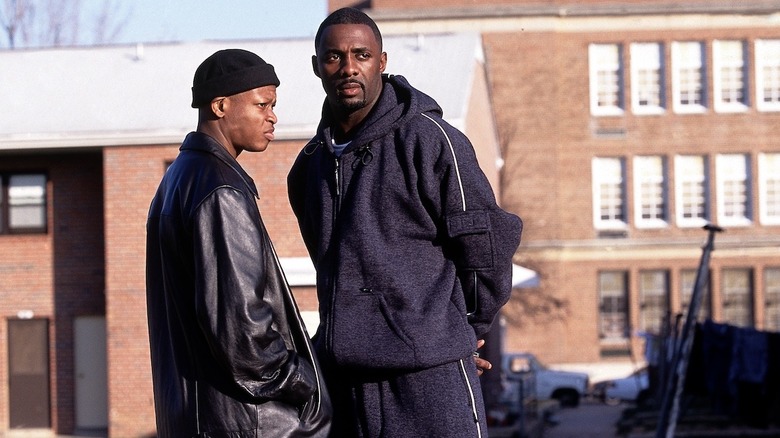The 15 Best Crime TV Shows Of All Time, Ranked
No matter the culture or time period, it really does feel like crime shows have made up the backbone of scripted television since the medium's launch. From "Dragnet" to "The Rockford Files," crime series have a long, prolific history, with the genre only growing more nuanced and complex over time. These shows have produced some of the most iconic characters ever to grace a television screen, as well as some of the longest-running series of all time. And while the sheer breadth of crime shows make it harder to narrow down, there are some series that clearly rise above the rest in the genre.
Crime shows can range from case-of-the-week police procedurals to character-driven thrillers and neo-Westerns. Simply put, there is a lot you can do within the crime genre, especially given the countless number of shows within it. Often, the best crime shows either push the boundaries or breathe new life into well-worn formulas with imaginative premises. Here are the 15 best crime TV shows of all time ranked and ready to make your next binge.
15. Broadchurch
While there are plenty of procedurals about a pair of detectives investigating murder in a small town, only one can boast having David Tennant and Olivia Colman as its stars. The 2013 British series "Broadchurch" has the performers play police detectives Alec Hardy and Ellie Miller, respectively, working in the fictional eponymous coastal town. The Broadchurch community is shaken to its core by the murder of a young boy, unearthing pent-up tension as Hardy and Miller mount their investigation. Subsequent seasons explore the fallout of the murder and its trial, along with new crimes rocking the coastal community.
While treading familiar territory, "Broadchurch" excels at exploring the impact of shocking crimes on a small town, giving the story a humanist quality. Creator Chris Chibnall gives all the major characters their own arcs while each episode offers its own emotional payoffs and developments in the case. Achieving worldwide success, "Broadchurch" inspired a number of remakes, including the American series "Gracepoint," which also starred Tennant. One of the best crime dramas to come from the United Kingdom, "Broadchurch" is magnificently staged and executed.
14. The Shield
Among the early wave of prestige television series in the 2000s was FX's "The Shield." Running for seven seasons from 2002 to 2008, the show follows a specialized team assigned to keep crime rates low in a particularly rough part of Los Angeles. With their rough-handed methods arousing suspicion, the Department of Justice assigns an outsider to the unit, only for its leader, Vic Mackey (Michael Chiklis), to murder him. This heightens the scrutiny and internal pressures on the unit while its captain, David Aceveda (Benito Martinez), uses its reported success to leverage himself into political power.
Initially a longshot pickup for the network, "The Shield" repositioned FX as a growing player of original shows in the cable television game. The series is one largely without heroes, with its cops as deadly and immoral as its robbers, regularly blurring moral lines. The show has an incredible cast and crew behind it, particularly Chiklis' role as Mackey, an unfailingly intense antihero. A searing crime thriller that pushed the boundaries of cop shows at the time, "The Shield" continues to hold up as FX's first masterpiece.
13. The Killing
An American remake of the Danish crime series "Forbrydelsen," 2011's "The Killing" features a series of murders in the greater Seattle area. Investigating these crimes are police detectives Sarah Linden (Mireille Enos) and Stephen Holder (Joel Kinnaman), with the first two seasons focused on the murder of teenager Rosie Larsen (Katie Findlay). The show often explores different impacts of its major crimes, not only on Linden and Holder, but also people close to the victims and the wider community. The series was picked up for a fourth season by Netflix, reuniting Linden and Holder to investigate another grisly murder.
Though "The Killing" may have overextended its inciting murder mystery to span two seasons, it still brings an excellent moody atmosphere to its Seattle setting. There is an underlying sense of dread that permeates throughout the series, accentuating the big developments that conclude most episodes. Even as the slow burn sizzles longer than expected, the sharp writing and performances keep the show riveting. An eerie show that capitalizes on its Pacific Northwest locale, "The Killing" functions just as well as a dark drama as it does as a gripping procedural.
12. Sherlock
While Sherlock Holmes is often firmly linked with the Victorian England time period in which he was created by Arthur Conan Doyle, the 2010 series "Sherlock" thoroughly modernizes the character. Benedict Cumberbatch stars as a decidedly 21st century Holmes, joined by Martin Freeman as the consulting detective's best friend and colleague John Watson. Using his keen observation skills and deeply analytical mind, Holmes assists the police in solving crimes around London. This places him and Watson on a collision course with several deadly enemies, including the devious Jim Moriarty (Andrew Scott).
With plenty of style to spare, including noteworthy cinematography often seen from Holmes' perspective, "Sherlock" triumphantly brings the classic literary property into the modern age. Many of the episodes are loose adaptations of Doyle's stories, albeit with their own updated twist, with the extended runtime making each installment feel like a mini-movie. And as inventive and slick as the episodes themselves are, the series' real appeal lies in the magnetic performances from Cumberbatch and Freeman. The role that made Cumberbatch a global superstar, "Sherlock" gives the timeless franchise one of its greatest incarnations.
11. True Detective
One of the shows that helped prestige anthology series come into vogue in the United States was the HBO crime drama "True Detective." Each season features its own main cast and standalone story, set in different locations and time periods around North America. In the case of first and third seasons, the story spans several years, with its protagonists tied up in an overarching grisly mystery. The protagonists are invariably police detectives, usually working in pairs, though the second season expanded its crime-solving team into a trio.
With its anthology approach, every season of "True Detective" has its own distinct mood and flavor, though the main cast is always a highlight. From the Southern Gothic mood of the inaugural season to frigid twilight of its fourth, "True Detective" consistently brings together solid actors and sharply written scripts. There's almost a literary quality to the series, particularly when it comes to character development and its deliberate pacing when setting its scenes. Hauntingly told, no matter what corner of America it explores, every season of "True Detective" feels like event television.
10. Justified
Author Elmore Leonard was one of the best crime writers of his generation, with his work spawning numerous adaptations. Arguably the best Leonard adaptation is the 2010 FX series "Justified," adapting Leonard's stories about U.S. Marshal Raylan Givens. Starring Timothy Olyphant as Givens, the show has the quick-draw lawman relegated to work out of his old home county of Harlan in Kentucky. Each season features an overarching conflict, with Givens usually contending with a crime family and their illicit business in different parts of his jurisdiction.
Olyphant was relatively fresh off starring in the HBO series "Deadwood" and "Justified" gives him another charismatic lawman to play. That distinction is elevated by the fact that the FX series is very much a neo-Western and one of the best of its kind as it modernizes familiar genre tropes. Olyphant is an easygoing natural in playing Givens, matched blow-for-blow by Walton Goggins as the local ne'er-do-well Boyd Crowder. A staple in FX's broadcast lineup for years, Olyphant reprised his fan-favorite role in the similarly well-received 2023 revival series "Justified: City Primeval."
9. Peaky Blinders
The mean streets of Birmingham are the subject of the period piece crime drama "Peaky Blinders," exploring the English city shortly after World War I. The titular street gang is led by their calculating boss Tommy Shelby (Cillian Murphy) as they fight for dominance of Birmingham's criminal underworld. The gang's growing ambitions eventually lead them to attract unwanted attention from the British military who intensify their efforts to clamp down on crime in the area. The main series spans the gang's activities from 1919 to 1933, while the show has since received a continuation movie.
Given its scope, "Peaky Blinders" feels like a truly sweeping crime epic in a part of the world and time period most outside of Britain may be familiar with. There is a razor-sharp attention to detail in bringing this environment and its characters to life, something that enhances the unfolding crime saga. The other major coup in the show's quality is its impressive all-star cast, led by Murphy at the height of his powers. An all-around masterclass in crafting an ambitious and smartly written period piece, "Peaky Blinders" is incredible television.
8. Better Call Saul
One of the breakout characters in the AMC crime drama "Breaking Bad" was the unscrupulous defense attorney Saul Goodman, memorably played by Bob Odenkirk. After wrapping "Breaking Bad," the crew dove immediately into the spin-off series "Better Call Saul," revealing the origins of Goodman's illicit legal career. The prequel reveals that Goodman was originally struggling lawyer Jimmy McGill, who opens a law practice against the wishes of his older brother Chuck (Michael McKean). As Goodman begins to increasingly cater his services to morally dubious clients, he finds himself drawn deeper into a dangerous world of crime around Albuquerque.
With most of the creative team behind "Breaking Bad" working on "Better Call Saul," still very much at the height of their powers, the show seamlessly continues its predecessor's legacy. At the same time, while the story is set in the same setting with many returning characters, the spin-off feels distinctly separate, standing confidently on its own merits. Powered by Odenkirk, the show features plenty of dark comedy, but also compelling legal drama moments as Goodman makes a name for himself. That said, "Better Call Saul" is very much a gripping crime thriller, with each season ramping up the suspense until its haunting finale.
7. Mindhunter
The public's fascination with notorious serial killers is the underlying fuel driving the Netflix original series "Mindhunter." The show follows FBI profilers Holden Ford (Jonathan Groff) and Bill Tench (Holt McCallany) who interview incarcerated serial killers for insight into the mind of murderers. While this helps the FBI identify and stop killers around the country in the late '70s and early '80s, it places Ford and Tench uncomfortably close to their lethal subjects. The series ran for two seasons, though fans continue to cling to hope for a potential third season.
Filmmaker David Fincher was a major creative force behind "Mindhunter," executive producing the series and directing seven of its 19 episodes. That behind-the-scenes presence is acutely felt, with the show exuding much of the rigorous attention to detail and dark thriller tones that Fincher's film work is known for. There is a rich depth to the show's character arcs and overarching story that crime shows so rarely possess, making it stand clearly above most of its counterparts. Deliciously creepy and atmospheric as all get-out, "Mindhunter" stands as the best crime show Netflix has produced to date.
6. Homicide: Life on the Street
In 1991, investigative reporter David Simon published the nonfiction book "Homicide: A Year on the Killing Streets" recounting his experiences observing homicide police detectives in Baltimore for a year. The book served as the primary source material for the 1993 crime procedural "Homicide: Life on the Street," which ran for seven seasons on NBC. True to its origins, the show follows homicide detective in Baltimore, including veteran detective Frank Pembleton (Andre Braugher). The 2000 continuation television movie, "Homicide: The Movie," has the surviving members of the unit reassemble to solve the murder of one of their own.
Though the '90s saw the advent of the crime procedurals that continue to dominate broadcast television today, no other show at the time felt like "Homicide: Life on the Street." With a relatively grimmer tone, being filmed on location in Baltimore, and its then-innovative use of handheld cameras, there was a greater authenticity to the series. The show also boasted a solid ensemble cast, led by a breakout performance from Andre Braugher, and plenty of memorable guest stars. An overlooked masterclass of its era, many crime shows today have taken their cues effectively from "Homicide: Life on the Street."
5. Fargo
The 1996 crime movie "Fargo" by the Coen Brothers serves as the narrative and tonal springboard for the FX anthology series of the same name. Created by Noah Hawley, each season of "Fargo" features a standalone story, complete with its own time period and cast of characters. Primarily set in Minnesota, the narrative shares an overarching continuity as it explores different crime stories around the Midwest. The crimes themselves in each season range from feuding crime syndicates to wandering contract killers, all affecting the communities around them.
At the end of the day, "Fargo" is about how seemingly ordinary people fall victim to consequences driven by their vice-fueled mistakes. Every season has someone succumb to their greed and pride, with the bill inevitably, and often violently, coming due by the end of the story. Hawley expertly approaches this underlying theme in fresh ways with every tale and an all-star ensemble cast to bring it to life. A wonderfully constructed anthology crime series, "Fargo" has grown to outshine the legacy of its cinematic inspiration.
4. Luther
If "Sherlock" is a show about delving into the dark wonders of London after dark, "Luther" is a show about confronting its nightmares. Idris Elba stars as police detective John Luther who takes on vicious serial killers as part of his regular unit. This inevitably takes a toll on Luther's personal life, including his connection with the enigmatic murderer Alice Morgan (Ruth Wilson). Premiering in 2015, the show ran for five seasons and received a Netflix original continuation movie, "Luther: The Fallen Sun" in 2023.
"Luther" is arguably the outright scariest show on this list, with many episodes featuring mounting tension to unbearable levels before the killers strike. This makes Elba's powerful performance all the more effective as a counterpoint, knowing that Luther's keen mind and strength are perfectly poised to save the day. That said, Luther himself is a deeply damaged man from his experiences, something the show instills from its first season, adding emotional layers to the dark procedural. Fantastically written and an absolute tour-de-force performance from Elba, "Luther" is as grimly thrilling as the genre gets.
3. The Sopranos
If there was ever a show that kicked off the era of prestige television that we're still enjoying today, it's "The Sopranos." James Gandolfini stars as New Jersey mafia boss Tony Soprano, who begins seeing a psychiatrist after suffering panic attacks. As Tony reluctantly opens up about his emotional issues, he balances his precarious suburban family life and challenges to his mobster position. This includes Tony clashing with his uncle Junior Soprano (Dominic Chianese) and the New York-based Lupertazzi crime family.
Anchored by Gandolfini, "The Sopranos" features an impressive ensemble cast that brings this mobland saga to life. At its core, the show is a family drama as Tony's indiscretions and violent occupation spread into his domestic life, but with plenty of mafia-fueled action to keep audiences riveted. With its premise of a mob boss seeking psychiatric help and the other foibles the characters endure, the series is a subtle postmodern deconstruction of the standard-issue tough mobster archetype. One of the greatest shows ever produced by HBO, "The Sopranos" still is the gold standard for mob series.
2. Breaking Bad
So much of quality television lies in the writing and there are few shows as tightly plotted and constructed as the 2008 AMC series "Breaking Bad." The Albuquerque-set crime drama centered on Walter White (Bryan Cranston), a mild-mannered high school chemistry teacher who is diagnosed with terminal cancer. Determined to leave enough money behind for his family, White begins cooking and selling meth with drug dealer Jesse Pinkman (Aaron Paul), attracting the attention of local crime syndicates. As the pair's venture becomes increasingly lucrative, they find themselves drawn deeper into working with more and more deadly crime figures.
At its core, "Breaking Bad" is about the steady moral erosion of Walter White, given how quickly he dispenses with his family man persona to become a murderous drug lord. That series creator Vince Gilligan and his team chart that progression so meticulously across five seasons is a testament to its unmatched writing and acting. Every season feels like an improvement over the last, which is saying something given how good the show was from the start. A masterpiece from every aspect of its production, "Breaking Bad" is one of the best shows ever made of any genre.
1. The Wire
After David Simon's experiences as a crime journalist in Baltimore was adapted into "Homicide: Life on the Street," he wanted to create a series that better reflected his work's tone. This led to the eventual creation of the HBO crime procedural "The Wire," with Simon working with writing partner and former homicide detective Ed Burns. A meditation on urban decay, the show revolved around Baltimore's homicide detectives and various criminal elements in the city. Each season of "The Wire" explored how crime and municipal negligence affected different parts of the city, like education and politics.
True to Simon's intent, "The Wire" does feel bleaker, darker, and more authentically graphic than "Homicide: Life on the Street." The show steadily weaves a portrait of a city in decline, seen from a growing number of perspectives as it progresses. At its core, the story is powered by the conflict between the police, drug dealers, contract killers, and other crooks, but it's really about the soul of Baltimore. Led by an impressive ensemble cast, including the late Lance Reddick, "The Wire" uses the crime genre as a backdrop for an American tragedy.
